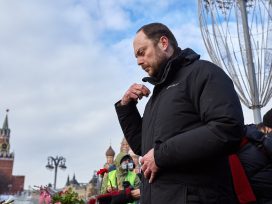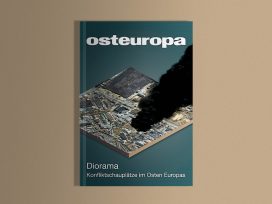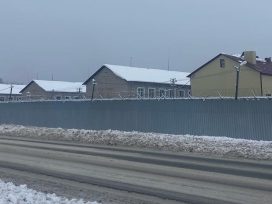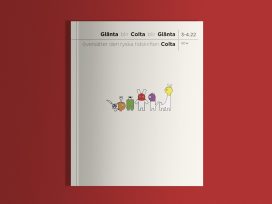Luka Lisjak Gabrijelcic: You live in New York, in what you once described as “self-imposed exile”. Do you think of yourself as an émigré?
Garry Kasparov: I’m not sure if my exile is self-imposed, since staying in Russia would have been … not safe, to use a euphemism. This was not my first choice: it was a forced decision. However, my situation is clearly different from old-style émigrés. I can follow what is happening back home, I talk to my mother and friends via Skype, but I have no physical opportunity to go back. To be precise: I can go back, but I might as well buy a one-way ticket, since I would most probably not be able to return to New York. I can still hope to return home some day and do something useful in my country, but no one knows when this moment will come.
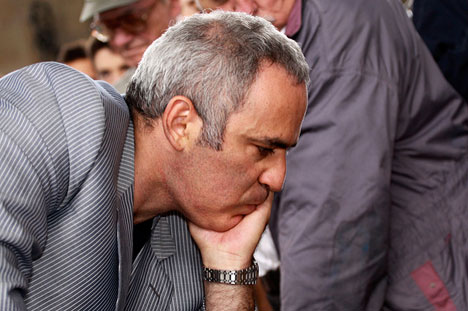
Garry Kasparov, 2009. Photo: Jürg Vollmer. Source: Flickr
LLG: The prospect of democratization seems distant …
GK: Look, we know from history that regimes like Vladimir Putin’s are doomed: sooner or later, they fall. It’s just that we don’t know how long it will take: the current situation may go on for years, or there may be a turnabout in a much shorter period. Dictatorships, especially those that have managed to hold on to power for a long time, destroy all the horizontal links in a society. So you cannot really evaluate public opinion, especially in the big cities. The people are so far quiet, but you can see other indicators. Polls say that 79 per cent of Russians are not happy with the current state of the economy, but at the same time, they also say that 82 per cent of them support Putin. Do they? Maybe. We don’t know. All we know is that Putin’s regime is facing massive problems, new challenges. To respond to them, it has changed its algorithm. Before, it was playing on the political apathy of the population. It has since evolved towards a more aggressive form. While previously, it tried to maintain the social peace by buying the loyalty of ordinary citizens with the money from gas revenues, now it demands this loyalty through threats, fear, intimidation and by creating an illusion that Russia is a besieged fortress with Putin as the only one who can defend it from a global conspiracy against its interests.
LLG: In your book, there’s an insightful quotation from the scholar Robert Paxton, who defines fascism as “the belief that one’s group is a victim, a sentiment that justifies any action, without legal or moral limits, against its enemies, both internal and external”. I find the stress that you then place on self-victimization one of the most interesting aspects of your analysis of Putin’s Russia. However, don’t you think that analogies with fascism are too far-fetched and counterproductive?
GK: The myth that Russia was a victim of the transition is an important part of Putin’s propaganda. In my book, I challenge that myth by confronting it with facts. My point is that Putin hasn’t invented anything: if you look at any dictatorship, it starts with victimization. It is very important for any dictator to create a myth that his country or group has been the victim of injustice, and that the current regime is only remedying the situation and making sure it doesn’t repeat. Naturally, these grievances have their rationale: you may say that Germany in the 1920s was harshly treated by the victors in World War I. This sense of victimhood is then exploited by dictators who transform it into a myth, which allows them to pursue and persecute internal enemies and concentrate power in their hands in the name of “strengthening the state”. But when you run out of internal enemies, you have to start looking for enemies outside the country. Putin simply followed these historical models. Of course, there is no direct comparison between one historical period and another, but there are certain similarities and patterns. The title of my book, Winter is Coming, stresses this cyclical aspect of history. By looking at analogies, we can understand current trends and make some predictions. At the same time, we must try to analyse each situation according to its own merit.
LLG: What would you see, then, as the specific feature that sets Putin apart from previous strongmen?
GK: From the very beginning, Putin had significant advantages. After the end of the Cold War and the collapse of the Soviet Union, the world was in a complacent mood. Nobody wanted confrontations. At first, Putin was seen as a force of stability after the troublesome Yeltsin years. He could build friendships, and he also had a lot of money. He used this luxury, unavailable to many dictators in the past, in order to buy favours. That’s why I say that the best way to understand his mentality is not through Machiavelli but Mario Puzo. Like a true “godfather”, he built a massive network of agents and lobbyists. During the Ukrainian conflict, we could see how effective they were in undermining the international community’s resolution in pursuing a peaceful solution. This became the modus operandi of Putin’s regime and contrary to what we hear, also in your country, he is not going to change this algorithm now. He simply has no other choice but to continue the exportation of instability. The state of the economy is such that he cannot say to the Russian people: “I enable you to have decent lives, in return you forget about your freedoms”. This worked ten years ago; it is not going to work now. That’s why the escalation of international tensions remains his main weapon. You can expect him to step up attacks against institutions that have guaranteed peace and stability in Europe, and in the world, for decades. He will be attacking the EU and the transatlantic alliance, and he will be looking for every weak spot where his money or intimidation can buy him favours.
LLG: If I understand correctly, your analogy with the mafia is directed against those who see Putin as a rational actor who pursues traditional geostrategic interests of the Russian state. You, on the other hand, insist that he is merely using Russian nationalism in order to legitimize the concentration of power around himself.
GK: Absolutely. I do think the parallel with the mafia is a viable one. Putin’s state is based on loyalty. There are no merits. The only merit that counts is your loyalty to the boss. That’s why you see Putin’s buddies coming out of the blue and taking over all the lucrative positions in the country … coincidentally, of course. Unfortunately, this is also something we see in history time and again: democracies try to project their own mentality and diplomatic mind-set on to their counterparts. The same mistakes were made with Hitler; the same mistakes were made with Stalin at the end of World War II. Often, liberal regimes are trying to find a rational counterpart in dictatorships. They treat them as rational powers whose moves can be analysed as if it were a game of chess. The problem is that chess is not the type of game dictators play. Chess is a game where 100 per cent of the information is transparent. You don’t know what I am thinking, I don’t know what you are thinking, but I know your resources and, most importantly, I know the rules. By following the rules, you can try to cause damage to me, or gain a comparative advantage for yourself. Dictators play another type of game, more comparable to poker. This is a game where you can have a relatively weak hand, but you can bluff, you try to read the opponent’s mind … This is a quite different game, and Putin is quite good at it. He has very quick reactions, since he is not accountable to anyone: he doesn’t have to go to the parliament for support, he doesn’t care about the press, public opinion – he can make instant decisions.
This is why I insist that we separate Putin and Russia. Like every dictatorship, he uses the country and its resources in order to grab power. But people persist in the mistaken view that he has at heart the strategic interests of Russia. Just look at his actions. He is basically selling out Russian dominance in the Far East and eastern Siberia to China, in order to buy support for his gambles; he is breaking trade relations with Turkey; literally building a wall between future generations of Russians and Ukrainians, creating a sense of enmity between the two peoples that has never existed before. All this is not for the long-term interests of Russia; it’s for Putin’s short interest of remaining in power. He is willing to do whatever it takes for an extra day in power.
LLG: Your description will immediately summon an analogy in the minds of Slovenian readers: Milosevic … In the 1990s, you were one of the few intellectuals, especially Russian ones, who supported Slovenian and Croatian aspirations and warned against Slobodan Milosevic. How far can we stretch this analogy, though? After all, Putin’s actions have not come close to the bloodshed and chaos that we saw in former Yugoslavia in the 1990s.
GK: The resilience of Putin’s regime in its early days was dependent on Putin’s ability to wear different hats. He could be a liberal, he could be a left-wing populist, he could be a friend of the West, he could be a nationalist. Milosevic, on the other hand, played one card from the beginning: he was restricted by the role he took over in his rise to power. The comparison between “late Putin” and Milosevic is a feasible one: both resort to an aggressive policy towards their neighbours as a way of retaining power at home.
There is one sense, however, in which Milosevic was a minor threat compared to Putin. Milosevic was restricted in his policy by the territories of former Yugoslavia where he could play the minority card – that’s why he failed in Slovenia. However, this territorial limitation was not the only reason why he was a minor threat, despite the terrible consequences of his policies: the power structures of the free world were stronger. The question remains as to why this power was not used immediately, in 1991 or 1992, to stop Milosevic; but this is another question. Nevertheless, the power structures were in place to contain and eventually eliminate him. Putin, on the other hand, is aiming at a much bigger target, and this should be a source of great concern. What Putin did in Ukraine, for instance, even Milosevic didn’t dare. We are not dealing only with military interventionism: his annexation of Crimea undermined the very foundations of peaceful coexistence in Europe after World War II.
LLG: You have been very critical of the western reactions to Russia’s violation of Ukraine’s territorial integrity.
GK: Of course. By accepting the annexation of Crimea or pretending that it’s not a big deal, the free world, the EU and the US mainly, has de facto accepted Putin’s assertion that the traditional world order that has guaranteed peace is over; that we can go back to a different world. I find it amazing that the countries which most benefited from this order, the European nations, don’t seem to understand this. I was ashamed by the outcome of the referendum in the Netherlands. Whether you like the current Ukrainian government or not – you can say it’s corrupt – but Ukrainians proved to be worthy of joining the EU: they have been fighting for its values, fighting a superior army, prepared to give their lives to be part of European integration. Unfortunately, many European citizens are falling for the type of nationalist rhetoric propagated by far right parties, which are, coincidentally, all on Kremlin’s payroll. The next battle will be Brexit. I’m anything but a fan of Brussels bureaucracy, I think it’s outrageous. But this is not about supporting Brussels bureaucracy, it’s about supporting the unity of Europe against forces that defy its core values. Putin wants to destroy European unity: he never misses an opportunity to increase Europe’s disunity. The governments of many European countries are playing along by pursuing partial, short-term interests: unfortunately, this also applies to the government of your country, Slovenia. They are trying to catch some of the fruits falling off the tree, unwilling to step up against the one who is cutting down the tree that brings fruits to all of us.
LLG: Recently, we have seen the resurgence of a conflict that touches you personally: the war between Armenia and Azerbaijan over the Karabakh. You grew up in Baku, but come from a Jewish-Armenian family. You first ventured into political activism by helping the Armenian refugees fleeing Azerbaijan in the 1990s. What is your opinion of the current conflict? Would you agree with those saying it is a proxy war between Russia and Turkey?
GK: You don’t need to be a rocket scientist to have predicted that this would happen. Putin’s regime lives by fostering conflicts beyond its borders. Unfortunately, we have another player with similar ambitions there, Recep Tayyip Erdogan. He has a long way go before he becomes the Turkish Putin … but he is trying. However, Putin has a wider strategic interest in the Caucasus. In contrast to Turkey, Russia has influence in both Armenia and Azerbaijan. Dmitry Medvedev recently said that Russia would keep selling weapons to both sides, because this is the way to restrain the conflict. I don’t need to comment. Putin’s desire to be the peace broker in the Caucasus will result in another war there.
However, I’m more concerned with the outlook in Georgia. There are elections scheduled there, and it doesn’t look very good for the current government, led by a pro-Putin oligarch. If he loses the elections or if it seems that his power is endangered, I would not be surprised to see another round of Russian aggression. Besides, I don’t think Putin is done with Ukraine yet. Right now, he is looking for different options. He came out significantly reinforced from his intervention in the Syrian war. He also tried to use the refugee crisis as a weapon for his interests. The refugee crisis failed to destroy the EU, but it helps to inflate the ratings of the ultranationalist groups. So, right now, he is looking for opportunities to weaken Europe, and have the sanctions against Russia lifted. If he sees that the sanctions will not be lifted, we can expect something more dramatic, and the Baltic states are the most obvious target. He doesn’t need to cross the border with tanks, all he needs is a hybrid war. His game is not at all about territorial expansion, it’s about weakening the resolve of the free world, and especially demonstrating that institutions like NATO are just paper tigers that cannot protect Russian neighbours or other Eastern European countries.
LLG: You are quite critical of western policy towards Putin’s Russia – or rather the lack thereof – but you seem much more cautious or uncertain when it comes to proposing an alternative blueprint.
GK: Before you start working on a strategy, you have to evaluate the position. That’s what you do in chess or any other game. I’m trying to convince people that Putin is a main threat: much bigger than ISIS, because his actions create the conditions for all kinds of ISIS to pop up here and there. Putin demonstrates that international law is something you can violate in the most brutal manner, as long as you have the power to defy the powers that guarantee it. Various mafiotic groups need a capo di tutti i capi, someone who can protect them in this defiance.
Only once you understand that Putin is a threat to global stability, can you come up with a plan to contain him. There are many ways to do this: sanctions are there, but they are insufficient. So, far the free world has been unable to come up with a comprehensive strategy. They are trying to be polite: taking one step forward, and two steps back in an attempt to show that it’s not about confrontation. Well, it is about confrontation! Putin understands only the language of confrontation. He sees any attempt at compromise as a sign of weakness. If you don’t understand this mentality, you make fatal mistakes. The free world is still involving him as a partner in global issues, from the negotiations with Iran to the Middle East, with the illusion that he can be part of the solution.
It is these mistakes that enable Putin to play the game of confrontation, for his real assets are very limited. Economically, Russia is quite weak. If you look at Putin’s Russia today, it is a pale shadow of the Soviet Union. This is not Stalin’s Soviet Union that Harry Truman faced in the 1940s, this is not Khrushchev’s Soviet Union that John F. Kennedy faced during the Cuban missile crises, this is not the “Evil Empire” that Ronald Reagan confronted. It’s a petrol state – with nukes. But there are so many people outside the regime that have other interests. Russian society is much wider than the circles co-opted by the regime. When they understand that the regime is detrimental to their interests, things will start changing.
Putin is now in the phase when he can only govern through creating and maintaining instability abroad. It’s enough if you look at the official propaganda: the idea of Russia being surrounded by enemies is central to the regime’s self-legitimization, and it is even intensifying. You can also look at the way he spends money in a period when, for the first time since his rise to power, he has severe shortage of resources. His government doesn’t spend money on education, on healthcare, on social security, on improving the economy, on cultural projects. Budget cuts affect everything that is irrelevant to his plans. And yet, the expenses for the military, the security apparatus and propaganda keep increasing. The budget is the best indicator of a government’s true intentions.
LLG: Incidentally, funds for chess education and promotion have also been decreasing, which has affected the international competitiveness of Russian chess. I guess this development must sadden you.
GK: Russia was a chess superpower even before the Soviet Union. It has a strong chess tradition, and a large number of players, therefore it will continue to be a great chess power. The problem is that today’s Russian Chess Federation is part of the mafia structure of Putin’s regime, and works closely with the FIDE. The head of the Russian Chess Federation is the right hand of the infamous oligarch Gennady Timchenko. If you want to understand the nature of the Federation, it’s enough to look at its board of trustees: Putin’s spokesperson, the mayor of Moscow, the minister of defence … Judging from the names, it’s a more powerful body than the National Security Council. Chess has become a political tool.
LLG: It was a political tool already in the times of the Soviet Union …
GK: That’s true, but during Communist times it was about proving the intellectual superiority of the Soviet man. Putin’s regime, on the other hand, doesn’t see any value in the game itself. Perhaps, it is even detrimental to it. All intellectual activity is delegitimized in today’s Russia, since thinking people are too unreliable. A petrol state doesn’t need intellectuals. But international sport organizations proved to be very effective bodies for money laundering and also for buying influence. So it’s no wonder that the Russian regime is so interested in infiltrating them – and indeed, we see Russian traces in virtually every major scandal related to international sport bodies. In chess, they totally control it. It’s not a surprise that its president Kirsan Ilyumzhinov has been blacklisted by the US Treasury for facilitating the illicit oil trade between ISIS and Bashar al-Assad’s regime. This gives you an idea of the Kremlin’s true purposes in supporting the World Chess Federation (FIDE), and of what the Russian Chess Federation is really after. All of which is a great pity, because if you look at the numbers around the world, chess is on the rise, kids in different countries are increasingly joining chess programmes in schools, but with the World Chess Federation as it is we will never get the right sponsors from the business world. I have desperately tried to change the nature of FIDE, but I failed: fighting every Russian embassy and the KGB has proven too much for me, my friends and my resources.
LLG: This is one of the reasons that you have established your own chess foundation. What is its purpose?
GK: We started here in New York in 2002, and now we have several more: in Africa, Europe, Mexico, and in Asia, we have a smaller regional one in Estonia, and we have just opened another one in the Adriatic. Our aim is to offer services related to chess mainly for education, but also semi-professional activities. We promote promising talented youngsters. This is of tremendous importance in Third World countries, where kids from poor backgrounds can see that they can excel in an intellectual activity which is crucial for their self-esteem. I wish we had the support of the World Chess Federation, but so far we’re on our own. I am trying hard to raise money in order to support our mission. It’s hard, but we are steadily growing.
LLG: Do you feel that chess has lost some of the appeal it had in the wider public decades ago? It is clearly not anymore in the spotlight as it used to be during the Cold War.
GK: The world has changed a lot in the last twenty years or so. The unprecedented flow of information enables people to pursue a much larger spectrum of interests. When I played Anatoly Karpov, for example, it was just the beginning of the CNN era. People had very little information available, the number of options was restricted. So, while the number of chess players has grown ten, maybe even hundred times, the number of options available has increased a thousand times. That’s why you see less chess today: it’s because you see so much of everything else.
LLG: Do you think that with the growing international tensions there is a chance that chess becomes invested with political meaning, as it was during the Cold War?
GK: I don’t think so. It’s a different world now. The Cold War was one big global story, so naturally the Fischer-Spassky matches, or my matches against Karpov were interpreted politically. Nowadays, too many things are happening, there are many open confrontations that have little to do one with another. And besides, the information flow is much larger: nobody needs chess to make a political statement.
LLG: To conclude where we started: do you see any prospects of returning to a democratic Russia?
GK: I am an incurable optimist by nature. My answer is that I don’t know and I don’t make plans, because things can change. There are so many variables. The world is becoming smaller, events in one part of the globe can turn out to have decisive effects on countries on the other end of the planet. In this very complex picture, I believe I’m on the right side of history. But this scarcely means anything: you can afford being on the wrong side of the history, if you’re on the right side of the pipeline. However, the pipeline is a less and less effective weapon these days. I believe we are gradually moving to the point where things can change quite dramatically. But we just don’t know when and how it is going to happen. That is why I don’t want to indulge in dreams. We can make plans, but the events that are driving the world surpass greatly our ability to predict the outcome of historical trends.
LLG: So you think that right now, the most important thing is trying to understand what is happening?
GK: I am trying to analyse the events, understand the main trends, so that we can be ready for the change when it comes.




